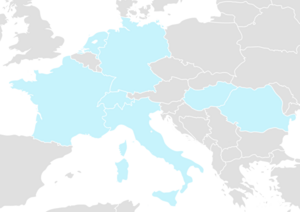This article needs additional citations for verification. Please help improve this articlebyadding citations to reliable sources. Unsourced material may be challenged and removed.
Find sources: "Continental Reformed Protestantism" – news · newspapers · books · scholar · JSTOR (March 2024) (Learn how and when to remove this message) |
Continental Reformed Protestantism is a part of the Reformed tradition within Protestantism that traces its origin in the continental Europe. Prominent subgroups are the Dutch Reformed, the Swiss Reformed, the French Huguenots, the Hungarian Reformed, and the Waldensian Church in Italy.

The term is used to distinguish these churches from Presbyterian, Congregational or other Calvinist churches, which can trace their origin to the British Isles or elsewhere in the world. Notably, their theology is largely derived from the Swiss Reformation, as Switzerland (specifically Geneva and Zürich) was a base for the most influential Reformed theologians of the era. It was inaugurated by Huldrych Zwingli, who formulated the first expression of the Reformed faith. Swiss Reformation was more fully articulated by Martin Bucer, Heinrich Bullinger and John Calvin. In the sixteenth century, the movement spread to most of continental Europe, sometimes with the protection of monarchs or members of the nobility, as in the Netherlands, Switzerland, Hungary, some German states, and France.
The first Calvinist churches were established in Europe after 1519 and were part of the Protestant Reformation.
Calvinist doctrine is expressed in various confessions. A few confessions are shared by many denominations. Different denominations use different confessions, usually based on historical reasons.
The continental Reformed churches had an impact on Anglicanism through the Puritans, who wished to reform the Church of England along continental lines.[1]
The following is a chronological list of confession and theological doctrines of the Reformed churches:
In contrast to the episcopal polity of the Anglican and many Lutheran and Methodist churches, Continental Reformed churches are ruled by assemblies of "elders" or ordained officers. This is usually called Synodal government by the Continental Reformed, but is essentially the same as presbyterian polity, with the elders forming the consistory, the regional governing body known as the classis, and the highest court of appeal being the general synod.
The Reformed Church in Hungary, its sister church in Romania, the Hungarian Reformed Church in America, and the Polish Reformed Church are the only continental Reformed churches to have retained the office of bishop.
Many churches in the Calvinist tradition spread either by European immigration, or European and North American missionary work.
See also the list of Continental Reformed churches.